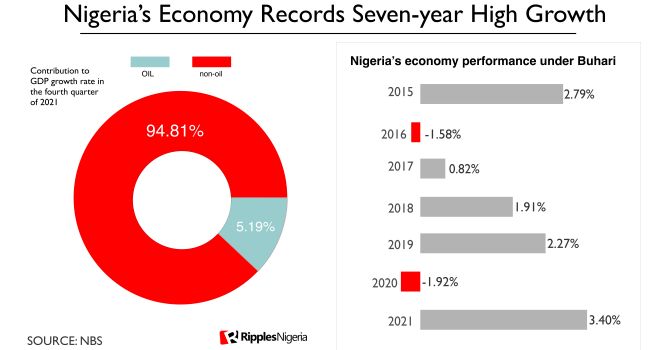Ripples Metrics
ICYMI…RipplesMetrics: Nigeria’s economy grows strongest in 7 years but data show economic hardships persist

Thursday, February 17 can be correctly regarded as data day. Four separate data sets were released by the National Bureau of Statistics (NBS).
These include the GDP report for the whole year 2021, as well as how much Nigerians spent in January 2022 for cooking gas, kerosene, Premium Motor Spirit (Petrol) Price Watch, and Automotive Gas Oil (Diesel) Price Watch.
The GDP report had good news. For the first time under the administration of President Muhammadu Buhari, Nigeria’s economy recorded a growth rate of more than 3%.
The 3.45 percent GDP growth rate provided by NBS also indicated Nigeria’s economy grew faster than Nigeria’s population yearly growth rate of 2.7 percent.
The other NBS data set, on the other hand, revealed increasing pressure on Nigerian families.
According to NBS, the average price for a 5kg cylinder of Liquefied Petroleum Gas (Cooking Gas) grew by 85% in January 2022 to N3,594.81, from N1,949.02 in January 2021.
Similarly, the average retail price of kerosene per litre climbed by 24.69 percent to N437.11 in January 2021, up from N350.55 in January 2021.
In addition, the price of diesel climbed by 28.12% to 288.09 per litre in January 2022, up from 224.86 in the same month previous year.
The average price of petrol climbed to N166.40 in January 2022 from N164.09 in January 2021, representing a 1.41 percent year-on-year rise.
So, why is the economy growing when price of goods is increasing
Except for the first quarter of 2020 (1.87%) and the fourth quarter (0.11%), the economy recorded two negative growth, Q2 (-6.10 percent) and Q3 (-3.62 percent).
However, this does not negate the efforts of the CBN and the Finance Ministry. Out of the 46 activities sectors tracked by the NBS,
36 recorded positive growth rate while 10 contracted.
The sectors are highlighted in the chart below.
Takeaways
Without a doubt, the economy rebounded in 2021 but the troubles are far from over.
Nigerians have yet to feel the impact as cost of food and living continue to rise.
As indicated in NBS GDP data, the agriculture sector is growing but not at a pace that can bring quick succor to Nigerians.
Crop production’s 2.27 percent growth rate ranks at 31st position while rail sits at number one.
In 2020, the sector recorded a 2.24 percent growth rate and one would have expected it to perform better given the billions poured in to help activities in the sector by the Central Bank of Nigeria.
At the last monetary policy meeting, CBN governor Godwin Emefiele announced that over N927. 94 billion had been disbursed to over 4.5 million smallholder farmers, who are cultivating 21 commodities across the country, but this is yet to fully reflect.
A bag of rice has remained unchanged at N25,000 to N30,000, depending on location. This is similar to what obtains on other food staples.
Nigeria’s inflation remains at double digits (15.6%) despite a decrease in January 2022.
Food inflation, which accounts for all volatile agricultural produce decreased to 17.13% in the review month, from 17.37% recorded in the previous month.
According to the report, the rise in the food index was caused by increases in prices of bread and cereals, food products, potatoes, yam and other tubers, soft drinks, oils and fats and fruit.
More work needs to be done in the coming months, and 2022 will provide a clearer picture of Nigeria’s economic health.
Join the conversation
Support Ripples Nigeria, hold up solutions journalism
Balanced, fearless journalism driven by data comes at huge financial costs.
As a media platform, we hold leadership accountable and will not trade the right to press freedom and free speech for a piece of cake.
If you like what we do, and are ready to uphold solutions journalism, kindly donate to the Ripples Nigeria cause.
Your support would help to ensure that citizens and institutions continue to have free access to credible and reliable information for societal development.


























